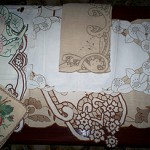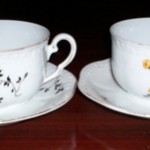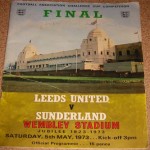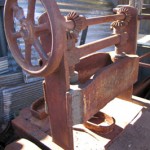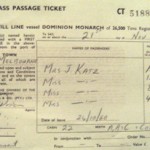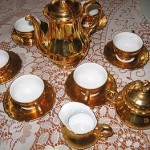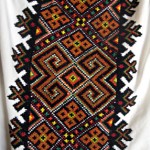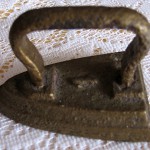Italian
San Ferdinando, Reggio, Calabria, Italy
Naples, Italy in April 1949
Melbourne on 1 May 1949
Dad’s friends in Melbourne then his home in Leeton, Riverina, NSW
Working on family farm.
Running family home from childhood and own fruit and vegetable shop in Ganmain, NSW.
I came to Australia on the ship Napoli in 1949. I left from Naples when I was 13 with my mother Marianna and my little sister Lucia (Stella) who was ten. My hometown was San Ferdinando, Reggio Calabria, Italy [and] we lived near my grandmother and Zia (Aunty) Spasmina. We were coming to meet up with my father who had come out [to] Leeton in Australia [in] 1939 to have a better future with lots of work and money to be made.
Dad was able to write to us before the war but we did not hear from him again until after the war – then we received a few letters. The war was terrible. I lost my mother’s father and my aunty was hit by shrapnel from a bomb at the farmhouse. I remember we looked after her and cleaned her wounds with the only thing we had, which was metholated spirits. After the war, the doctor found that gangrene had started in her feet. She survived and later came to live with us in Leeton.
When we were packing to come to Australia (well, we used to say ‘America’, which could have meant Argentina, America or Australia – it was how we thought of the world then!), we could have packed more and left behind many beautiful things like our good china. We thought we would have better things here in Australia.
We brought our second china set of 12 white cups with the yellow and black flowers. In Italy, Mum would use these cups for some special occasions but here in Australia we would use them all the time when family would come over or for visitors. There are only two left now, the rest broke.
One of the kitchen things we packed was a setaccio, an aluminium tomato sieve which is used to make pasta sauce. We would boil the ripe tomatoes and let them cool a little, then squeeze the tomatoes through the sieve. The skin and seeds are left on top and the puree is able to pass through the holes and caught in a bowl underneath. In Italy, and later in Australia, we would do this every time we would have pasta sauce which was a lot. In the summer, when there were a lot of tomatoes we would do a big batch, pour it into bottles and preserve it for the winter months. I remember my Aunty Caterina asked us to bring her one from Italy, no-one had one here.
I made sure I bought a beautiful, pink, cafe latte cup which was one of Zia Francesca’s. She was the eldest of the aunties. She left to go the real ‘America’ in 1937 to meet up with her husband and she wasn’t going to take anything with her. I remember asking her if I could keep this cup. I thought it was so beautiful and I loved it. I bought it with me to Australia. Every time I look at it I remember her. They were bought for her as a wedding present.
The other thing that I made sure I packed was a miniature ceramic tea set which was given to me by my Uncle Peter Celi in 1943 during the war. We were out of the town on our farm to keep away from the bombs. On one of his trips to town he came back with presents for me, my sister Stella and his son Fred. He gave me the little tea set because I was the eldest. Stella got a little wooden cow and Fred, a ceramic donkey. I loved my little tea set, I thought it was so beautiful; I used to play with it [a] lot but was always very careful, I did not want to break it, so I was not going to leave it behind in Italy. I still love it, it is very special.
We packed our linen, some of which was my embroidery. When I was in 5th class at school in Italy, I was 11 or 12, during the summer holidays the nuns would have classes to show us how to do embroidery. We made some lovely things; runners, sheet edges, doilies, pillow cases. I used them all here in Australia for a few years.
Before we left I went with my mother to a jewellery shop to buy some gold and the shopkeeper asked, “Where are you going, senora?” Mum replied, “America”. I never knew where America was but I think I knew Australia was not America. The shopkeeper asked again, “Which America?” Mum answered, “Australia”. The shopkeeper replied, “You can’t call Australia ‘America’, Australia is a colony of England”, which was correct but we didn’t understand, not until later.
On the ship there was one man from our town. He got off at Fremantle, but he helped us a lot. There were mostly Italians and a few Germans on board. The ship was awful. It was not a passenger ship, it used to be for cargo, and they put us in a dormitory style room, with one floor for the women and one for the men. When we boarded the ship I was saying it was nice, then we started to move out of Naples and I started to get seasick. As we moved around Sicily, it was horrible. I was sick for the whole trip, I couldn’t eat anything because as soon as I did, I would start throwing up again.
I got off at Melbourne and my father was there to meet us. I was only four years old when my father left Italy and Stella was not even born, so it was the first time she had met him. We arrived in the morning, I was so excited to see this man who was my father but also a bit shy. I didn’t know how to act around him, he was like a stranger.
We stayed one night with an Italian family that Dad knew, and we had a nice meal there. I remember that was where I had jelly for the first time in my life. The lady didn’t have a fridge but because it was so cold in May she put the bowl on the window sill and it set. It was the best thing I had ever eaten.
The next morning we got on the train to come to Leeton which was in the Riverina [region] of New South Wales and there was a big frost. I had a lot of family that were already living in Leeton and I remember when we got into the railway station at Leeton, all our family were there to meet us. Zia Angela, Zio (Uncle) Michele and their daughter Lucia; Zia Caterina & Zio Dionisio and their daughters; Zio Rocco and his family; Zio Domineco. It felt great to see them and my mother was very happy to see her brothers and sister and meet her sister-in-law.
Zio Rocco had been in Australia since around 1926 and he called a lot of the family over to Australia. You had to have someone living here to get permission to come. My father lived with Mum’s sister Caterina and her husband Dionisio until we arrived.
My first home in Australia was at Brobenah Road where my father had a block of land with a little house on it. We only had the bare necessities there, just a bed in the bedroom with an old wardrobe, no fridge. We were not very happy. I wanted to go back and so did my sister. I would ask my father if we could go back but there was no money to go back.
I was happy when I was with all my cousins and I would get lonely without them but they could not spend every day with me. I started to go to the local catholic school, St Joseph’s Primary. The kids did not look at us in a nice way, they would call us ‘dago’ but I didn’t understand what they were saying, they could have called us whatever they wanted. It was only after I had learnt a bit of English that I knew what they were saying. I spent maybe one month at school. I had the nuns teaching me and they were very nice and wanted to help. There was only one or two who were a bit nasty.
I had to leave school because my mother got really sick and because I was the eldest, I had to stay home and look after her and the house. My sister still went to school. She was only ten years old then.
My father would grow fruit and vegetables that he could sell [to] the local Letona Cannery, things like beans and tomatoes in the summer and peas in October. When the crop was ready for picking, I would have to help.
I learnt English by listening to the radio and talking to my cousins and people that we met. I tried very hard to learn. My father could speak English but he always spoke to us in Italian.
I did not go out to work, I was expected to look after the house and help my parents. I was expecting Australia to be something nice and be full of beautiful rich things, but it was not like that at all. I had to work very hard as a young person.
I was not allowed to go out alone but we did go out as a family to the movies. We would go to the Roxy Theatre every Wednesday and Saturday nights. At first I didn’t understand [English] but I learnt over time. We would meet up with other Italian families. I didn’t have a lot of ‘Australian’ friends as I did not go out to meet any.
On the farm we had lots of fresh ingredients so there was always something to eat. My mother taught me how to cook, she was a great cook. When she was sick I had to learn how to do the meals. She would tell me what to do from her bed. I had to get water from the channel with buckets, boil the copper to wash the clothes outside. We had a wood stove and didn’t have a kettle, so every morning I had to start the fire and put on the saucepan to boil the water for a tea or coffee. I had to light the fires to warm the house.
My sister and I didn’t have any coats and we were always cold. We only had light summer clothes which we had to use all year round. I was sick a lot. It took a couple of winters to get some warm clothes. My mother knew how to knit and could slowly make us warmer clothes, a cardigan or jumper.
We adjusted to the way of life in Australia as we got older.
I married in 1958 to Armando Pasquetti. He was from Umbria, Provencia Paruga, Italy. We met in Leeton and have three children: Anna, Silvio and Fred. A few years later we moved to Ganmain, a little town about 45 minutes away and we bought a fruit shop there. The two eldest children went to school and I worked in the shop. I think I learnt a lot of my English in Ganmain because there were no Italians, so I had to learn. The people in Ganmain were lovely and knew I could not speak English much and instead of laughing at me, they would teach me how to say things. I had a nice neighbour who would look after my little baby, Fred. She would say, “Carmel, leave Fred with me. You can’t manage the shop and look after him as well!” She was lovely. The children only spoke Italian before they went to school and when they went to school with their ‘Australian’ friends all day, I would try to get them to speak Italian at home but they found it difficult, so they would speak English back to me. Fred now complains that I didn’t teach him how to speak in Italian.
When the children finished high school we came back to Leeton to be surrounded by our family and have lived here ever since.


![Carmela Pasquetti with her setaccio – tomato sieve "My Aunty Caterina asked us to bring her one, no-one had one here. In Italy, we boil the ripe tomatoes, then squeeze [them] through the sieve. We would do this every time we have pasta sauce which was a lot."](../../../cms/wp-content/uploads/2008/10/photo226.jpg)


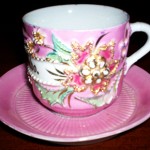

!["My Aunty Caterina asked us to bring her one, no-one had one here. In Italy, we boil the ripe tomatoes, then squeeze [them] through the sieve. We would do this every time we have pasta sauce which was a lot."](../../../cms/wp-content/uploads/2008/10/sieve-150x150.jpg)
